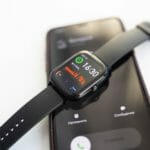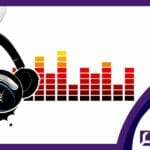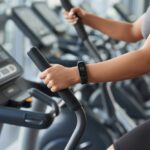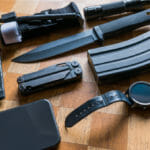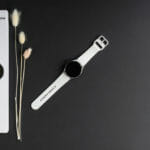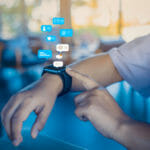While health insurance can cover the treatment for atrial fibrillation, it rarely covers extensive use of AFIB detection. But it’s important. AFIB detection and monitoring is key to determining how to treat the heart condition so as to prevent stroke, heart failure and more.
For this reason, many sufferers have started to look into buying smartwatches for AFIB. But can you imagine if you spent hundreds of dollars on a smartwatch that gave inaccurate AFIB readings? The result could be devastating, and not just because of the money spent.
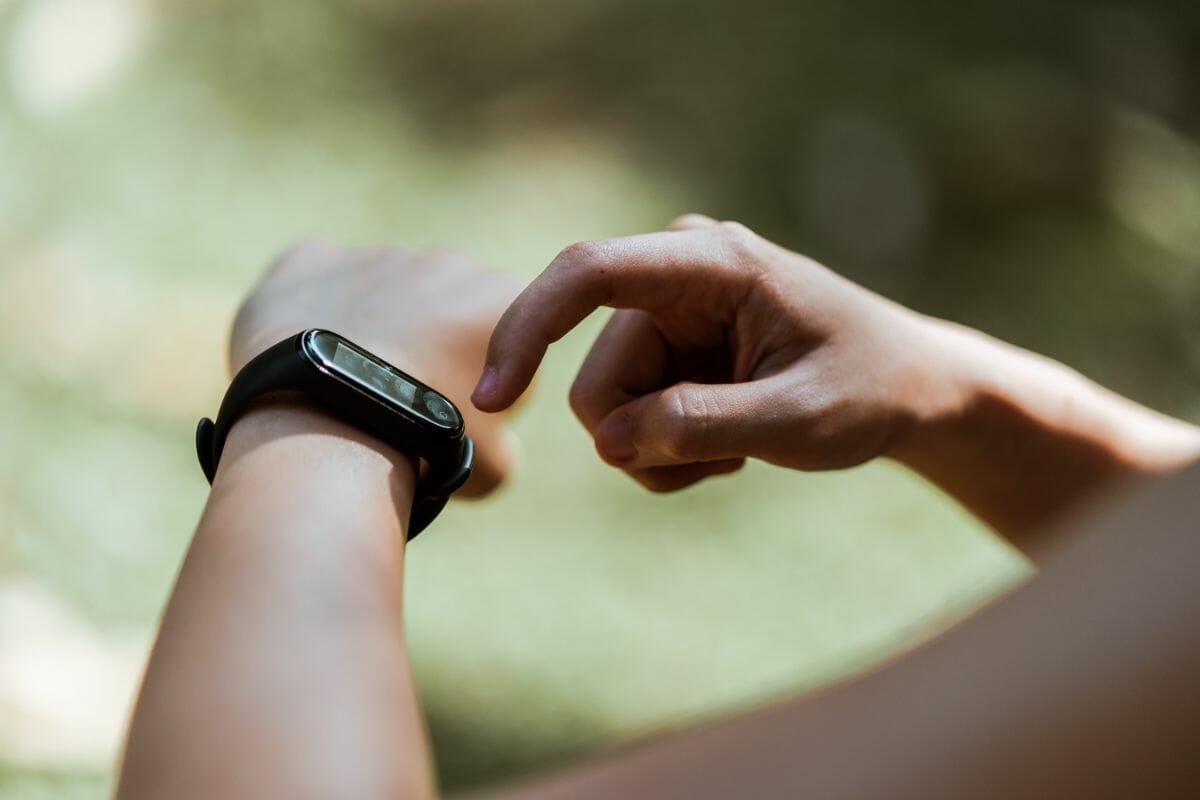
For this reason, I’ve put together this article, reviewing 5 of the best smartwatches out there for AFIB that are all FDA approved. Later you will also find a handy buying guide and FAQ section.
Let’s get to it.
Best Smartwatch For AFIB
For this article, I carefully picked out and tested 5 branded smartwatches that are all FDA approved and wouldn’t hesitate to recommend for someone at risk of arrhythmia and it’s consequences. There’s one Apple Watch, two Samsung, and two Fitbits.
OUR TOP PICK
The interesting thing about Apple smartwatches is that they were actually the very first smartwatch to get approval from the FDA for their ECG sensor and app for detecting AFIB.
But what’s even more interesting is that since this happened in 2018, which by the way was backed up by a very large research study, Apple has now refined their tech further still for the Apple Watch Series 7.
In fact, it can generate an ECG that’s pretty much the same as a single-lead electrocardiogram.
It’s a particularly good AFIB smartwatch for the elderly, who are at greater risk of a stroke, because it also has fall detection, and will automatically call the emergency services if it detects a fall.
You will get notifications for irregular heart rhythms, and it will also track blood oxygen levels, stress levels, physical activities such as workouts, and sleep.
It comes with GPS as standard, and you can also add cellular connectivity, so you can make and receive calls and texts even when your phone is nowhere in sight. And it has Apple Pay too.
My Testing:
- I wore this watch for several weeks. During this time, I got no notifications about AFIB, which is a good thing for me, but I could see a graph of my ECG, and it showed a regular heart rhythm during this period.
- Although it’s not as good for AFIB detection as the Fitbit Charge 5, the Apple Watch Series 7 is my favorite one because you can get it with both GPS and cellular connectivity.
Pros
- Includes fall detection - and will automatically emergency services
- Accurate AFIB detection - detects AFIB with an accuracy of 98.5%
Cons
- Only compatible with iPhones - doesn’t work with Android smartphones
- Requires charging every night - battery lasts no longer than 18 hours a time
Also available to buy at:
EDITORS CHOICE
Not only does this watch have an ECG sensor and app, but it also has an EDA sensor designed to monitor the electrical signals in the skin that signify stress.
Together, this means that the watch can identify not just arrhythmia, but also other heart rate conditions besides.
Additionally, there’s an advanced heart rate sensor which continues to work non-stop day and night, and it monitors blood oxygen saturation levels as well. It also offers advanced sleep and stress tracking.
It will also track your location through GPS, distance covered, steps, calories burned, and so on.
When you first look at the product page for this watch, you may be fooled into thinking that it’s only a health and fitness tracker and not a smartwatch. However, I can confirm
My Testing:
- I found it interesting to view changes in my blood oxygen saturation levels, and I can confirm that the advanced heart rate sensor remained in action at all times.
- I was quite impressed with its ability to detect when I was stressed.
- I missed being able to listen to music on my watch.
Pros
- Best for AFIB - ECG, HR, EDA sensors & apps, plus SpO2 monitor
- Best aesthetic - slimline and minimalist look and appearance
Cons
- Issues with GPS connectivity - resulting in inaccurate position tracking
- No built-in storage - which means you can’t download music onto it
Also available to buy at:
BEST VALUE
ECG sensors on Samsung watches attained their FDA approval much more recently, coming out in 2020, and although the one on the Galaxy Watch 4 is no improvement on its predecessor, it does do the job very well.
That said, however, it does not do so on a 24/7 basis. You can only do it when you’ve got it hooked up via Bluetooth using the Samsung Health Monitor app on your smartphone.
On the plus side though, it can also monitor your BMI, your blood pressure, your blood oxygen levels, your sleep cycles, your stress levels, and your respiration.
It also offers fall detection which is a big plus for anyone at risk of a stroke, and it’s a great workout tracker as well, particularly when it comes to long distance activities, thanks to its superior GPS tracking.
My Testing:
- Having tested it out, I was suitably impressed by this watch, and the only downside for me is that the AFIB monitoring is not continuous, which I imagine could be a dealbreaker for some
Pros
- Superior GPS signaling - has traditional GPS AND GLONASS & Galileo
- Fall detection - ideal for those at risk of a stroke
- Monitors stress, blood oxygen & more - even more health tracking for you
- Cellular connectivity - you don’t need your phone to make calls
- On board voice assistant - you can send verbal instructions to the watch
- Great battery life - it can last a good couple of days on a full charge
Cons
- Does not check for AFIB 24/7 - you can only get it when connected to your smartphone
- Works with Android phones only - more specifically, ones with the Android 6.0 OS or higher
Also available to buy at:
RUNNER UP
The great thing about Fitbits is that they’re compatible with both iPhones and Android phones, which is great if you haven’t decided what phone to go for, or are thinking of changing phones.
They’re also significantly more affordable as well.
This is a great health tracking smartwatch because of all its different sensors, including a multi-path optical heart rate sensor, various electrical sensors for both ECG and EDG apps, a skin temperature sensor (for stress sensing), and sensors for blood oxygen saturation levels.
Fitbit got their FDA approval for its AFIB detection toward the end of 2020, and they did so by conducting numerous clinical trials which determined the watch’s ability to differentiate between a sinus rhythm and atrial fibrillation.
Sinus rhythms were correctly identified 100% of the time, while AFIB detection was determined 98.7% of the time.
And Fitbit has improved on this since, with the introduction of a special photoplethysmography (PPG) algorithm.
And it’s great for monitoring other health concerns such as hypertension and sleep apnea. And this is particularly valuable since sleep apnea can increase the risk of heart failure by a staggering 140%.
It also has built-in GPS, speaker, and microphone, and can play music.
My Testing:
- Personally, I’ve never been concerned about sleep apnea, but I think it’s a great feature to have considering its links to heart failure.
- I was impressed with how comprehensive the data was that it can collect in total, and it prompted me to learn more about my condition.
Pros
- Amazing battery life - typically lasts between 3 and 6 days on a full charge
- Compatible both with IOS and Android - use with any phone you like
- Continuous ECG monitoring - you can monitor for AFIB at all times
- Best value for money - one of the most affordable in my round-up
Cons
- Relatively small dimensions - clockface is less than 41 mm in width
- No fall detection - makes it less suitable for those at risk of stroke
Also available to buy at:
RUNNER UP
The Samsung Galaxy Watch Active 2 is considerably more affordable than the Galaxy Watch 4, and makes an excellent alternative.
The Galaxy Active 2 is just as accurate in monitoring AFIB through its ECG sensor as the Galaxy Watch 4.
The Active 2 also tracks other important health factors including heart rate, blood pressure, stress levels, sleep cycles, BMI and respiration rate.
It also houses several built-in sports profiles, such as hiking, running, swimming and more. Helped by the GPS location tracking.
It’s great for music too, you can either stream your favorite tunes, or download them to listen to when you don’t have a connection.
The battery life is also about the same as the Galaxy Watch 4, able to last up to 3 days on a full charge.
And if you were to buy the LTE model, you can even take and make calls and texts directly from the watch, even when your phone is not in Bluetooth range.
My Testing:
- Given how well I felt this watch performed, I was very surprised to find it at such a low price compared to the Galaxy Watch 4.
Pros
- Amazing battery life - typically lasts between 3 and 6 days on a full charge
- Compatible both with IOS and Android - use with any phone you like
- Great value for money - one of the most affordable in my round-up
Cons
- No fall detection - makes it less suitable for those at risk of stroke
- Has a discontinued OS - the operating system for this watch is Tizen
Also available to buy at:
Buying Guide
As promised, here’s your buying guide. Allow me to walk you through the key points to consider when choosing a smartwatch for AFIB.
ECG Monitoring And Accuracy
This is THE most important factor in choosing a smartwatch for AFIB, since it is only through ECG or EKG monitoring that you can track irregular heartbeats.
In order to achieve FDA approval for use as an AFIB smartwatch, the watch has to have an accuracy for detection of at least 90%. Most of the watches reviewed in this article are actually even more accurate than that.
Continuous ECG monitoring is particularly valuable if you want to monitor AFIB as you sleep, which is kinda crucial if you’re also at risk of sleep apnea, which significantly increases the risk of heart failure.
GPS
If you have a serious heart condition, and you may need a first responder to get to you as quickly as possible, then GPS can come in really handy if you travel a lot and go to unfamiliar places.
If location tracking is particularly important to you, then you may be interested in a watch that provides an additional global satellite navigation system besides traditional GPS, such as GLONASS and/or Galileo.
Stress Tracking
When it comes to reporting your arrhythmia to a doctor, it’s also helpful to report your stress levels in order for them to judge any relationship there may be between your stress levels and your arrhythmias. This may, on occasion, require a skin temperature sensor.
Other Relevant Health Tracking
When it comes to cardiovascular health, you may also want to look into whether the smartwatch you’re considering can monitor your blood’s oxygen saturation levels, which will require an SpO2 sensor, or one that can monitor your blood pressure levels. Ideally both, of course.
Compatibility
The whole point of a smartwatch as opposed to a fitness tracker is that it can connect to your smartphone via Bluetooth in order to alert you to various notifications such as calls, texts, and more.
But such a smartwatch would be no use to anyone if it isn’t compatible with your smartphone, so it’s something you have to check before you buy.
Battery Life
If you’re going to be away from home for a while, and may not have the facilities to charge your smartwatch, then the longer the battery can last, the better. Especially if you want the device to monitor for AFIB while you sleep.
Other Features
Compatible Apps
It also pays to look into the apps associated with the health tracking to ensure that they cover everything you want them to and present the data in a way that you can see and understand.
Cellular Connectivity
While many smartwatches will alert you to calls and texts, ones that will allow you to make and take calls and texts are few and far between, since this would require cellular connectivity, which they rarely have.
Making and taking calls on a smartwatch will also require a built-in speaker and microphone.
Workout Tracking
Multiple studies have reported that the rate of atrial fibrillation in endurance athletes can be up to 10 times greater than in control subjects.
So there’s a good chance that if you’re reading this, you’re an endurance athlete, and if that’s the case you may also be interested in a smartwatch that has fitness and activity tracking for your particular sport.
Brand
I recommend sticking only with big name brands, not because I’m a snob, but because such brands have a reputation to maintain and are known for their quality.
When it comes to the best brands for smartwatches with AFIB detection, I would only go for Apple, Fitbit, or Samsung.
Value For Money
A brand-new smartwatch will typically cost anywhere between $100 and $500. You can save money by going for a refurbished smartwatch, but if you’re buying for tracking serious health issues, I totally get why you might be put off going for a pre-owned one.
If you like all the additional features of smartwatch and fitness tracker, such as GPS, then you can expect to pay several hundred dollars.
Frequently Asked Questions
Which Smartwatch For The Detection Of Atrial Fibrillation?
The best smartwatch for the detection of atrial fibrillation is the Fitbit Charge 5.
How Accurate Is The Fitbit For Atrial Fibrillation?
The Fitbit Sense can correctly identify a sinus rhythm 100% of the time, and correctly detect AFIB 98.7% of the time.
Can Apple Watch Detect AFIB Accurately?
The Apple Watch Series 7 detects AFIB with an accuracy of 98.5%.
How Accurate Is The Samsung Watch For Atrial Fibrillation?
According to an electrophysiologist at Rush Oak Park Hospital, namely Erica D. Engelstein, MD, Samsung Galaxy (and Apple Watches) monitor for AFIB, and I quote, “Very accurately”.
- Why is my fitness tracker not holding a charge? Your Lazy Battery Might Need a Pep Talk - February 9, 2026
- How to use Bluetooth headphones with a treadmill Without Accidentally Inventing a New Dance Move - February 8, 2026
- Fitbit Battery Life Comparison: Which Tracker Won’t Abandon You First? - February 8, 2026

